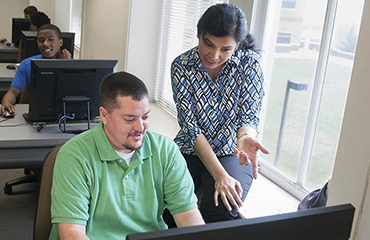 Lander University Assistant Professor of Computer Science Dr. Farha Ali has some impressive publications, as one would expect of the winner of Lander's Young Faculty Scholar Award.
Lander University Assistant Professor of Computer Science Dr. Farha Ali has some impressive publications, as one would expect of the winner of Lander's Young Faculty Scholar Award.
Her article, "The Smart Surface Network: A Bus-Based Approach to Dense Sensing," appeared last year in the scholarly journal, Computer Networks. Other articles have appeared in Journal of Technology, Knowledge and Society and International Journal of Pervasive Computing and Communications.
In 2007, seven years before she received her Ph.D. from Clemson, Internet Protocol Journal published her article, "IP Spoofing," the culmination of a project for which she also earned ethical hacker certification.
Another notable achievement was speaking last year at the Embedded Systems Week Conference in Amsterdam, in The Netherlands, on "Teaching The Internet of Things Concepts." The presentation grew out of a special topics course she taught at Lander.
While young, Ali is no newcomer to teaching. Before moving here 20 years ago from Pakistan, she tutored students in math, physics and chemistry. "I was getting a lot of students," she says.
For a time, after marrying Greenwood restaurateur Danish Ali, she was a stay-at-home mom, but the urge to teach was too strong to ignore. Since 2002, when she received her master's from Clemson, she's taught continuously at Lander.
In 2010, she announced that she was returning to Clemson to work on a terminal degree. She was given a schedule that allowed her to pursue her academic goals while continuing to teach full-time.
She calls the willingness of the Department of Mathematics and Computing to work with her "a blessing."
She feels she has also been blessed with "very good students." She tries to impress upon them that they must work hard to get ahead in life.
"Even if you are very, very smart, if you don't do that, you're not going to succeed," she says.
Sometimes, students go into computer science for the wrong reasons.
"This field is not about using the computer; it's about making the computer useful to other people," she says.
Her "biggest hurdle" is getting students to grasp that computer science is a science.
"A lot goes into it before you write a program. You need to know a lot more," she said.
The Internet of Things (IoT), the ever expanding network of objects embedded with electronics, software and sensors that enable them to send and receive data, is a field that intrigues Ali. She hopes to continue her search for "efficient ways to connect embedded systems local area networks with the existing Internet infrastructure."
Developing curriculum for teaching IoT concepts is another goal.
Dr. David Slimmer, dean of the College of Science and Mathematics, said that Ali "strives to stay modern in an ever-changing field." He congratulated her on winning this year's Young Faculty Scholar Award, calling her "a strong educator."